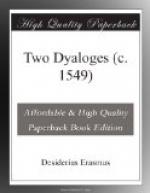dyssolue it well inoughe. Canni. What
woldest thou do, I praye the, and yf a man shulde
say to thy teth thou lyest falsely, or elles call
the by thy ryght name knaue in englysshe. Poli.
What wolde I do quod he, that is a question in dede,
mary he shulde feele the wayghte of a payre of churlyshe
fystes I warrant the. Canni. And what
and yf a man gaue you a good cuffe vpon the eare
that shulde waye a pounde? Poliphe. It
were a well geuen blowe that wolde aduauntage hym.
xx. by my trouthe and he escaped so he myght say
he rose vpon his ryght syde, but it were maruayle
& I cut not of his head harde by his shulders.
Canni. Yea but good felowe thy gospell boke
teacheth the to geue gentle answers, and fayre wordes
||agayne for fowle, and to hym that geueth the a
blowe vpon the ryght cheke to holde forth the lyfte.
Poliphe. I do remembre I haue red suche a thinge
in my boke, but ye must pardone me for I had quyte
forgotten it. Can. Well go to, what saye
ye to prayer I suppose ye praye very ofte.
Poli. That is euyn as very a touche of a pharesey
as any can be. Cannius. I graunt it is no
lesse the a poynte of a pharesey to praye longe and
faynedly vnder a colour or pretece of holynes, that
is to saye when a man prayeth not fro the bothum
of his hart but with the lyppes only and from the
tethe outward, and that in opyn places where great
resort of people is, bycause they wold be sene.
But thy gospel boke teacheth the to praye contynually,
but so that thy prayer come from the bothu of the
hart. Poli. Yea but yet for all my sayenge
I praye sumtyme. Can. When I beseche the
when ye art a slepe? Poli. When it cometh
in to my mynde, ones ||or twyse may chaunce in a
weke. Can. what prayer sayst thou? Poliphe.
The lordes prayer, the Pater noster. Canni.
Howe many tymes ouer? Poli. Onis, & I
trowe it is often inoughe, for the gospell forbyddeth
often repetynge of one thynge. Canni.
Can ye saye your pater noster through to an ende
& haue youre mynde runnynge vpon nothynge elles
in all that whyle? Poli. By my trouthe
and ye wyll beleue me I neuer yet assayed nor proued
whether I coulde do it or no. But is it not
sufficient to saye it with my mouthe? Can.
I can not tell whether it be or no. But I am
sure god here vs not excepte we praye from the bothum
of our harte. But tell me another thyng I wyll
aske the. Doest thou not fast very often?
Poli. No neuer in all my lyfe tyme and yf it
were not for lacke of meate. Can. And yet
thy boke alowes and commendes hyghly bothe fastynge
and prayer. Polip. So coulde I alowe them
but that my belly can ||not well affare nor a way
with fastyng. Cannius. Yea but Paule sayth
they are not the seruauntes of Iesus Christe whiche
serue theyr belly & make it theyr god. Do you
eate fleshe euery day? Po. No neuer when
I haue none to eate, but I neuer refuse it when
it is set before me, and I neuer aske question not
for coscience but for my belly sake. Can.
Yea but these stronge sturdy sydes of suche a chuffe




